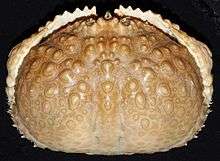Calappa japonica
| Calappa japonica | |
|---|---|
 | |
| Scientific classification | |
| Kingdom: | Animalia |
| Phylum: | Arthropoda |
| Subphylum: | Crustacea |
| Class: | Malacostraca |
| Order: | Decapoda |
| Infraorder: | Brachyura |
| Family: | Calappidae |
| Genus: | Calappa |
| Species: | C. japonica |
| Binomial name | |
| Calappa japonica Ortmann, 1892 | |
Calappa japonica, also known as the Japanese shame-faced crab,[1] is a marine species of box crab in the family Calappidae.[2]
Description
Calappa japonica is a large crab, and has a yellow and red colouration.[1] The length of carapace is approximately .65 times the width, with a tuberculated surface. Seven sharp teeth are located around the margins of each clypeiform expansion.[3]
Distribution and habitat
This species was first discovered in Tokyo Bay, Japan. It is now known to occur in regions as far away as Africa,[1] and lives in waters up to 250 metres deep.[1] and has been found in the Red Sea.[4]
Behaviour and diet
This crab is a predator, and feeds on invertebrates such as other crabs, as well as oysters and snails. It has a specially adapted right pincer which it uses to break open snail's shells. There is a large accessory tooth located at the base of the hinged part of the claw located opposite a flat plate on the fixed part. After breaking open the shell, it uses its left pincer. This is sharper and longer than the right.[1]
References
- 1 2 3 4 5 "The Japanese Shame-Faced Crab". Creature Feature. Western Australian Museum. Retrieved June 7, 2012.
- ↑ Peter Davie (2012). "Calappa japonica". World Register of Marine Species. Retrieved May 27, 2012.
- ↑ Tsune Sakai. "Calappa japonica". Crabs of Japan. Marine Species Identification Portal. Retrieved June 7, 2012.
- ↑ Vassily A. Spiridonov & Michael Apel (2007). "A new species and new records of deep‐water Calappidae (Crustacea: Decapoda) from the Indian Ocean with a key to the Mursia Desmarest, 1823 species of the region". Journal of Natural History. 41 (45–48): 2851–2890. doi:10.1080/00222930701770786.